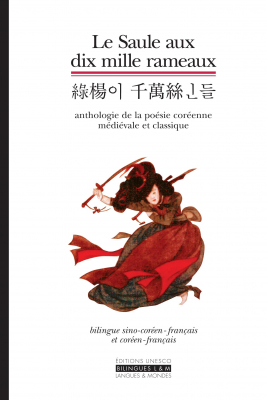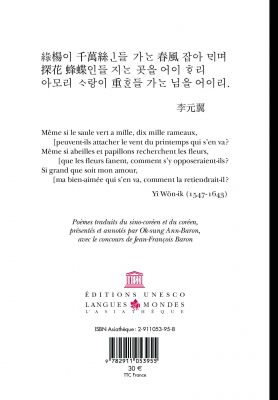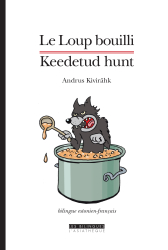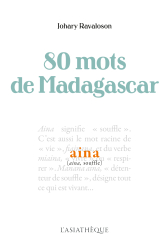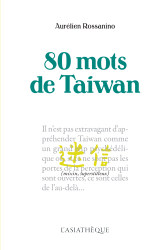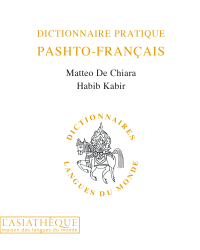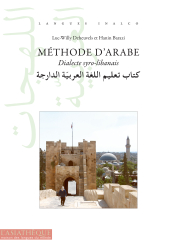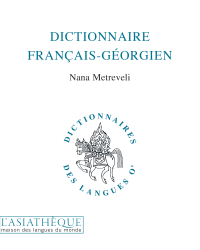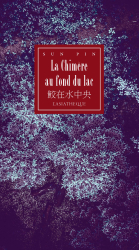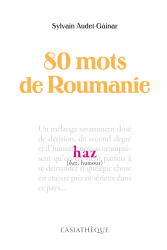Details
Format: Paperback
ISBN: 9782911053955
Collection: Les bilingues
12.5 x 18 cm
Weight: 483 gr
Pages: 544
First publication: 16/05/2005
Last printing: 05/2025
Unesco co-edition
Anonymous
Le Saule aux dix mille rameaux
Anthologie de la poésie coréenne médiévale et classique
bilingual Korean-French
Translation: Ok-sung Ann-Baron
Anthology of Medieval and Classical Korean Poetry
These poems, from the greatest Korean poets of the eighteenth and nineteenth centuries, are characterized by a strong connection to nature, with a nostalgic and emotional tone, and meditation on the impermanence of the physical world, often influenced by Buddhist philosophy. Some of these evocative titles : The Little Hermitage at the Corner of the Rock, To the Sound of the Rain, While the Spring Flows By, An Offering of Pine, The Tatters of Cloud, The Cinnamon Tree of the Moon... The anthology contains poems of all kinds, including short poems such as 시조 (sijo) and long narrative poems such as 가사 (kasa). Linguists and specialists will be fascinated by these original texts, often written in Chinese characters and the object of enormous amounts of verification and collation. Others will discover a fascinating traditional literary, still mostly unknown.
PRESS REVIEW
Anthology of Korean Poetry
"... Through its anthology, rich in unpublished works and explanations, Ok-sung Ann-Baron finally offers the tools to better understand the specificities of Korean inspiration and the freedom of its authors ..."
CONTRIBUTORS' BIOGRAPHIES
Ok-sung Ann-Baron
Ok-sung Ann-Baron is a scholar of Korean origin who has published numerous scientific articles in French on the art history of Korea.
TABLE OF CONTENTS
Histoire de la Corée – chronologie abrégée (History of Korea – abridged chronology)
Présentation (Presentation)
I. Poèmes des Trois Royaumes et poèmes du Grand Silla (57 av. J.-C. - 918 apr. J.-C.) (I. Poems of the Three Kingdoms and Poems of the Great Silla (57 BC - 918 AD))
Hyangga (chants du terroir) (Hyangga (local songs))
Chant du vœu de la Renaissance (Kwangdŏk, VIIe s.) (Song of the Renaissance Vow (Kwangdŏk, seventh century))
Chant d'adoration du maître Chukchi (Tŭgo, VIIe s.) (Worship Song of Master Chukchi (Tŭgo, SEVENTH century))
Chant des regrets (Sinch'ung, VIIe s.) (Song of regrets (Sinch'ung, seventh c.))
Ode au hwarang Kip'a (Ch'ungdamsa, circa 742-765) (Ode to hwarang Kip'a (Ch'ungdamsa, circa 742-765))
Élégie à ma sœur (Wŏlmyŏngsa, circa 742-765) (Elegy to my sister (Wŏlmyŏngsa, circa 742-765))
Prière au bodhisattva Avalokiteśvara aux mille mains (Hŭimyŏng, VIIIe s.) (Prayer to the bodhisattva Avalokiteśvara with a thousand hands (Hŭimyŏng, eighth c.))
Chanson de la rencontre avec les bandits (Yŏngjae, VIIIe s.) (Song of the meeting with the bandits (Yŏngjae, VIIIth c.))
Chanson de Ch'ôyong (Ch'ŏyong, IXe s.) (Song of Ch'ôyong (Ch'ŏyong, ninth century))
Chants des dix vœux de Samantabhadra (Kyunyŏ, 917-973) (Songs of the Ten Vows of Samantabhadra (Kyunyŏ, 917-973))
Hansi (poèmes en chinois) Hansi (poems in Chinese)
Pendant la pluie une nuit d'automne (Ch'oe Ch'i-wŏn, 857-?) (During the rain on an autumn night (Ch'oe Ch'i-wŏn, 857-?))
Monts Kaya (Ch'oe Ch'i-wŏn) (Kaya Mountains (Ch'oe Ch'i-wŏn))
II. Poèmes de Koryŏ (918-1392) (II. Poems by Koryŏ (918-1392))
Sogak kasa (paroles de chansons populaires) (Sogak kasa (popular song lyrics))
Chant des vertes montagnes (Anonyme) (Song of the Green Mountains (Anonymous))
Allez-vous partir? (Anonyme) (Are you going to leave? (Anonymous))
Du printemps plein le pavillon (Anonyme) (Spring full the pavilion (Anonymous))
En foulant le givre (Anonyme) (Stepping on the Frost (Anonymous))
Tongdong (Anonyme) (Tongdong (Anonymous))
Sijo (poèmes en trois vers)
Une branche d'épines dans une main (U T'ak, 1263-1343)
Le vent qui a fait fondre la neige (U T'ak)
Dans le vallon où se disputent les' corbeaux (mère de Chŏng Mong-ju, XIVe s.)
Chant du cœur rouge (Chŏng Mong-ju, 1320-1392)
En disant que le corbeau est noir (Yi Chik, circa 1362-1431)
Hansi (poèmes en chinois)
En raccompagnant quelqu'un (Chŏng Chi-sang, ?-1135)
Vie en montagne (Yi Il-le, 1152-1220)
Un jour d'été, deux poèmes à l'improviste (Yi Kyu-bo, 1168-1241)
Ermitage de la Grande Bonté (Yi Che-hyŏn, 1287-1367)
Couchant, dans un village de pêcheurs (Yi Che-hyŏn)
Pavillon de l'Azur Flottant (Yi Saek, 1328-1396)
Printemps (Chŏng Mong-ju, 1337-1392)
Visite à la cabane du lettré Kim (Chŏng To-jŏn, 1342?-1398)
Sŏnsi (poèmes bouddhiques en chinois)
Face au reflet (Hyesim, 1178-1234)
A l'école de la maladie (Hyesim)
Parabole de l'éveil (Hyesim)
Pour une âme morte (Hyesim)
Écrit au hasard de la flânerie (Ch'ungji, 1226-1292)
Écrit au hasard d'un moment de loisir, II (Ch'ungji)
Composé aux Aiguilles vertes, juste avant de retourner à la cime du Coq (Ch'ungji)
Éloge du buffle (Ch'ungji)
En réponse au sieur Yi Haeng-gam (Ch'ungji)
Vie en montagne, I (Kyŏnghan, 1299-1375)
Vie en montagne, VIII (Kyŏnghan)
Vie en montagne, XX (Kyōnghan)
Ce torrent-là (Pou, 1301-1382)
Visage de Choju (Pou)
Première neige (Hyegŭn, 1320-1376)
Source sans âge (Hyegŭn)
Mystérieux torrent (Hyegŭn)
Jour de la naissance de Bouddha (Hyegŭn)
III. Poèmes de Chosŏn (1392 -1910)
Sijo (poèmes de trois vers)
Quand ce corps sera mort (Sŏng Sam-mun, 1418-1456)
La nuit tombe sur le fleuve d'automne (Yi Chŏng, 1454-1488)
Longues, très longues nuits de décembre (Hwang Chin-i, XVIe s.)
Eh, toi, torrent d'azur dans la verte montagne ! (Hwang Chin-i)
La montagne bleue est mon amour (Hwang Chin-i)
À la recherche de la montagne profonde (Cho Uk, connu circa 1498-1557)
Monté de côté sur un buffle bleu (An Chŏng, connu circa 1506-1544)
Dix ans de labeur (Song Sun, 1493-1544)
On dit que le mont Géant est très haut! (Yang Sa-ŏn, 1517-1584)
Voici la montagne bleue sans paroles (Sŏng Hon, 1535-1598)
D'un morceau de mon cœur tranché (Chŏng Ch'ŏl, 1536-1593)
Ne sors pas la natte de paille! (Han Ho, 1543-1605)
Une nuit, sous la lune claire, sur l'île de la Montagne sereine (Yi Sun-sin, 1545-1598)
Même si le saule vert a mille, dix mille rameaux (Yi Wŏn-ik, 1547-1634)
On plante des bambous en guise de clôture (Kim Chang-saeng, 1548-1631)
Il paraît que le ciel au nord s'est éclairci (lm Che, 1549-1587)
Comment dormiriez-vous transi? (Hanu, contemporaine d'lm Che)
Dans la vallée foisonnant d'herbes vertes (lm Che)
On entend sans entendre les traits de la pluie (Kim Sang-yong 1561-1637)
L'amour c'est un mensonge! (Kim Sang-yong)
Chant des premiers kakis rouges (Pak Il-lo, 1561-1642)
En étirant dix mille kyun [de métal] (Pak Il-lo)
Il a neigé sur le villagge de montagne (Sin Hŭm, 1566-1628)
Le jour où j'ai dit adieu à mon bien-aimé (Hong Sŏ-bong, 1572-1645)
Quand chez vous l'alcool sera prêt (Kim Yuk, 1580-1658)
Chant des cinq amis (Yun Sŏn-do, 1598-1671)
Si, sur le chemin que je parcours en rêve (Yi Myŏng-han, 1595-1645)
La fenêtre à l'est ne s'est-elle pas éclairée? (Nam Ku-man, 1629-1711)
Le sentiment de l'âge et de la maladie (Kim Su-jang, 1682-?)
Hélas! Que c'est enfantin! (Kim Su-jang)
Le poil a blanchi mais... (Kim Su-jang)
Après l'éclaircie sur la rivière et le lac (Kim U-kyu, contemporain de Kim Su-jang)
Le vent a soufflé la nuit passée (Chŏng Min-gyo, 1697-1731)
Lever tardif sous la fenêtre du printemps (Kim Ch'ŏn-t'aek, circa 1724-1776)
Vous, gens de ce monde! (Kim Ch'ŏn-t'aek)
En voulant apercevoir ma bien-aimée en rêve (Yi Chŏng-bo, connu vers 1693-1766)
Fleurs de poirier tombées au vent fou (Yi Chŏng-bo)
Ma bien-aimée est venue en rêve (Pak Hyo-gwan, circa 1863-1907)
Que mon rêve d'amour pour ma bien-aimée... (Pak Hyo-gwan)
Ce col que franchit même le vent en se reposant... (Anonyme)
Si les larmes étaient des perles (Anonyme)
La pluie vient, pourquoi... (Anonyme)
Le vent qui a poussé la porte la nuit passée... (Anonyme)
Le Saule aux dix mille rameaux
Kasa (chants rythmés)
Chant de l'est de la passe (Chŏng Ch'ŏl, 1536-1593)
Chant pour le bel homme de mes pensées (Chŏng Ch'ŏl)
Ode au mont des Étoiles (Chŏng Ch'ŏl)
Chant de la paix suprême (Pak Il-lo, 1561-1642)
Événements de l'année à la ferme (Chŏng Hag-yu, vers 1835-1849)
Hansi (poèmes en chinois)
Pont aux Armoises (Yi Ch'ŏn, 1345-1405)
Au sud des remparts, à l'improviste, un jour de printemps (Kwŏn Kŭn, 1352-1409)
Vie oisive (Kil Chae, 1353-1419)
Inscrit sur une peinture de paysage (Kim Su-on, 1409-1481)
Sur l'un des poèmes du Bureau de la musique (Kim Su-on)
À l'approche de la mort, poème de l'agonie (Sŏng Sam-mun, 1418-1456)
Jour d'automne (Sŏ Kŏ-jŏng, 1420-1488)
En se levant de la sieste (Sŏ Kŏ-jŏng)
Inscrit sur le rouleau de l'oie sauvage (So Se-yang, 1486-1562)
À un ami (lm Ŏng-nyŏng, 1496-1568)
Chantonné au hasard au pavillon au bord de la rivière (Cho Sik, 1501-1572)
Offert à l'invité ivre (Yi Maech'ang, 1513-1550)
Voguant sur la rivière du sud, au couchant (Song Ik-p'il, 1534-1599)
Contemplation de la lune (Song Ik-p'il)
Écrit au hasard (Song Han-p'il, fin XVIe s.)
En montagne (Yi I, 1536-1584)
Au temple des Heureux Événements (Paek Kwang-hun, 1537-1582)
Un moment d'une vie oisive (Paek Kwang-hun)
Chagrin de femme (lm Che, 1559-1587)
Aux monts Kaya (Yi TaI, vécut entre 1567 et 1608)
Soupirs d'une pauvre femme (Hŏ Nansŏrhŏn, 1563-1589)
Sur la route (Kwŏn P'il, 1569-1612)
Jour du Repas froid (Ch'oe Ki-nam, 1586-1665)
Marche en montagne (Kang Paeng-nyŏn, 1603-1681)
Inscription sur une peinture (Kim Tŭk-sin, 1604-1684)
Face au miroir, au matin du jour de l'an, (Pak Chi-wŏn, 1737-1805)
En flânant à l'aube (Pak Chi-wŏn)
Capitale des Pins (Yu Tŭk-kong, 1749-?) (Capital of the Pines (Yu Tŭk-kong, 1749-?))
En écrivant, allongé à l'ombre d'un pin (Yi Sŏ-gu, 1754-1825) (Writing, lying in the shade of a pine tree (Yi Sŏ-gu, 1754-1825))
Sŏnsi (poèmes bouddhiques en chinois) (Buddhist poems in chinese)
Au disciple Transformation secrète (Pou, 1509-1565) (To the disciple Secret Transformation (Pou, 1509-1565))
Chant du corps adorable et merveilleux de l'Ornementation fleurie, I (Pou) (Body of the adorable and wonderful Floral Ornamentation, II (Pou))
Chant de l'action adorable et merveilleuse de l'Ornementation fleurie, II (Pou) (Song of the adorable and wonderful action of the Floral Ornamentation, II (Pou))
Chant de l'hymne adorable et merveilleux de l'Ornementation fleurie, III (Pou) (Song of the adorable and wonderful hymn of the Floral Ornamentation, III (Lou))
Éloge des corps et actions, causes et effets adorables et merveilleux de l'Ornementation fleurie, IV (Pou) (The raise of the Bodies and Actions, Adorable and Wonderful Causes and Effects of the Flower Ornamentation, IV (Pou))
Amarré, la nuit, dans la mer du Sud (Hyujŏng, 1522-1604) (Moored, at night, in the South Sea (Hyujŏng, 1522-1604))
Passant près d'une demeure, à l'écoute d'une cithare (Hyujŏng) (Passing by a house, listening to a sitar (Hyujŏng))
En montant au mont des Nuages blancs, on fredonne (Hyujŏng) (Going up to the Mount of White Clouds, we hum (Hyujŏng))
En passant la nuit, au temple de la Forêt Vide (Sŏnsu, 1543-1615) (Spending the night at the Temple of the Empty Forest (Sŏnsu, 1543-1615))
Sur les rimes de Ko Su-jae (Sŏnsu) (On the rhymes of Ko Su-jae (Sŏnsu))
Vie retirée (Kyŏnghŏn, 1544-1633) (Retired life (Kyŏnghŏn, 1544–1633))
À ceux qui cherchent la loi (Ino, 1548-1623) (To those who seek the law (Ino, 1548-1623))
Hyangŏrn et le bambou heurté (Ino) (Hyangŏrn and the struck bamboo(Ino))
Vie en montagne (Ino) (Mountain life (Ino))
Chant de l'école de la méditation (T'aeniing, 1562-1649) (Song of the school of meditation (T'aeniing, 1562-1649))
Poème d'avant la mort (T'aenŭng) (Poem before death (T'aenŭng))
Non-naissance (T'aenŭng) (Non-birth (T'aenŭng))
Maître On enfile les perles du petit chapelet (Ŏn'gi, 1581-1664) (Master On threads the pearls of the little rosary (Ŏn'gi, 1581-1664))
Réponse au poème de l'ami Forêt de l'Est (Ŏn'gi, 1581-1664) (Reply to the poem of the friend Eastern Forest (Ŏn'gi, 1581-1664))
Au lettré Kim (Such'o, 1590-1668) (To the scholar Kim (Such'o, 1590-1668))
Agrandissements des poèmes en chinois (Enlargements of poems in Chinese)
Index alphabétique (Alphabetical index)
Ouvrages de référence en français - bibliographie succincte (Reference works in French - brief bibliography)
Carte de Corée (map of Korea)
Mélodie-type de sijo (Melody-type of sijo)
